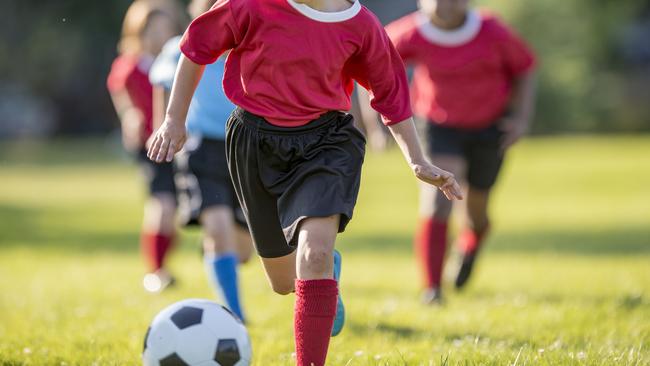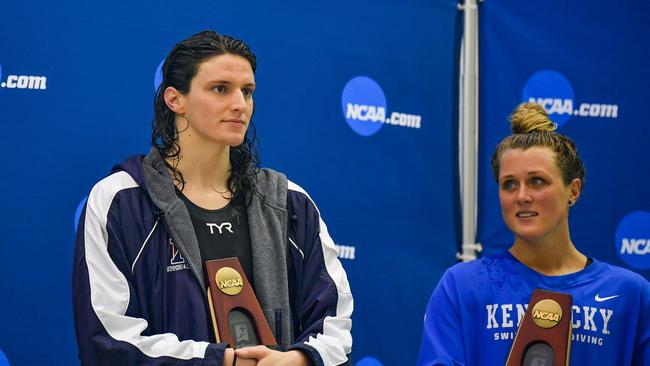Opinion: Sport is always unfair, but it could help keep our trans kids alive
Sport is a game of biological advantage. If we aren’t banning genetic freak-of-nature Michael Phelps from swimming, we shouldn’t ban trans women, writes Emily Olle.
Opinion
Don't miss out on the headlines from Opinion. Followed categories will be added to My News.
Let’s start this column with two facts. About one in 20 Australians have attempted suicide.
According to the University of Melbourne, almost half of all transgender Australians (44 per cent) have attempted suicide. That’s one in two.
I want you to keep this figure in your mind as you read on.
The conversation surrounding transgender competitors in women’s sport was brought to the fore once more last week, after World Athletics president Sebastian Coe announced elite transgender women would no longer be allowed to compete in female track and field events.
That same day, a transgender female student won an athletics race at an inter-school carnival in SA.
Whenever this “debate” arises, anti-trans rhetoric is shielded by the so-called ‘protection of fairness’ in women’s sport.
As someone who worked alongside some of SA’s most incredible female athletes, I can’t help but wonder how many of those crying foul about trans women in sport attended any of SA’s historic AFLW grand finals – or have purchased their tickets for this year’s FIFA Women’s World Cup.
Trans bans in sport centre around discussion of “biological advantage”, the premise that someone born biologically male must be athletically superior to those born biologically female.
As an under-researched field, the science behind this idea of ‘biological superiority’ when it comes to trans competitors who are undergoing, or have undergone, hormone replacement therapy – is limited, complex and murky.

But, purely for the thought exercise, let’s work from the premise that trans women have a “biological advantage”.
Biologically, sport is unfair. In high school, I was a passionate volleyball player. But, as a vertically-challenged 5’6 competitor, my dreams of making the Olympic team were dashed by my stature before I even began.
Michael Phelps, America’s most decorated Olympian of all time, is a genetic freak of nature. The double-jointed, long torso-ed, size 14-footed, 6’4 competitor was built to swim.
Should Phelps have been banned for his biological advantage? According to those seeking to ban trans athletes, you’d have to argue so. Where then do we draw the line for those genetically gifted in the sporting world?
Do we really believe that anyone is upheaving their life and transitioning simply to win a university level sporting game?
There’s also the issue of results. When a global debate rages about transgender female athletes, the term “storm in a teacup” feels particularly apt when you realise that, for the most part, these women aren’t actually winning.
After transitioning, University of Pennsylvania student Lia Thomas moved from 65th on the men’s team to first on the women’s team in the 500-yard freestyle. But only to fifth in the 200-yard freestyle. Through her female swimming career, she was beaten by multiple cisgender women.
The transgender SA athlete who ran in an inter-school meet at the weekend stormed her competitors. But didn’t even come close to beating decades’ worth of race records.

When it comes to school and community sport in particular, it certainly isn’t those on the ground – with trans women in their squads – fuelling the furore.
In last week’s SA school race, all other runners in the race were understood to be supportive of their fellow competitor’s inclusion.
Education Department chief executive Martin Westwell backed members of the trans community, reminding detractors that sport was “incredibly important for a person’s physical and mental wellbeing.”
“Gender diverse and intersex children and young people are supported by the Department for Education to participate in sport – as they should be,” he said.
For people of all ages, sporting clubs provide a place of support, inclusivity and achievement. And let’s be honest. How many trans children are actually competing? Do you know any transgender competitors in your children’s competitions? Or even at a state level?
Instead of worrying about one trans woman competing among hundreds of thousands of others, maybe that energy could be focused on fighting for pay parity in women’s sport, increasing representation in the media and encouraging young girls to compete.
Treating people with kindness, understanding and respect doesn’t cost a cent. Women – all women – are achieving amazing things. Let’s celebrate that.
Allowing highly marginalised people like our trans kids the opportunity to build lifelong friendships, be part of a community and, yes, even thrive in their chosen field, feels like the smallest kindness we can offer.
In fact, it could be the thing that keeps them alive.





